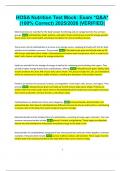Exam (elaborations)
HOSA Nutrition Test Mock: Exam *Q&A* (100% Correct) 2025/2026 |VERIFIED|
- Course
- Institution
HOSA Nutrition Test Mock: Exam *Q&A* (100% Correct) 2025/2026 |VERIFIED| Macronutrients are essential for the body’s proper functioning and are categorized into four primary groups: carbohydrates, lipids, proteins, and water. These nutrients are crucial for energy, growth, tissue...
[Show more]



